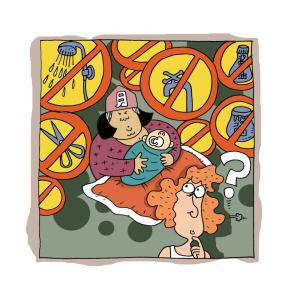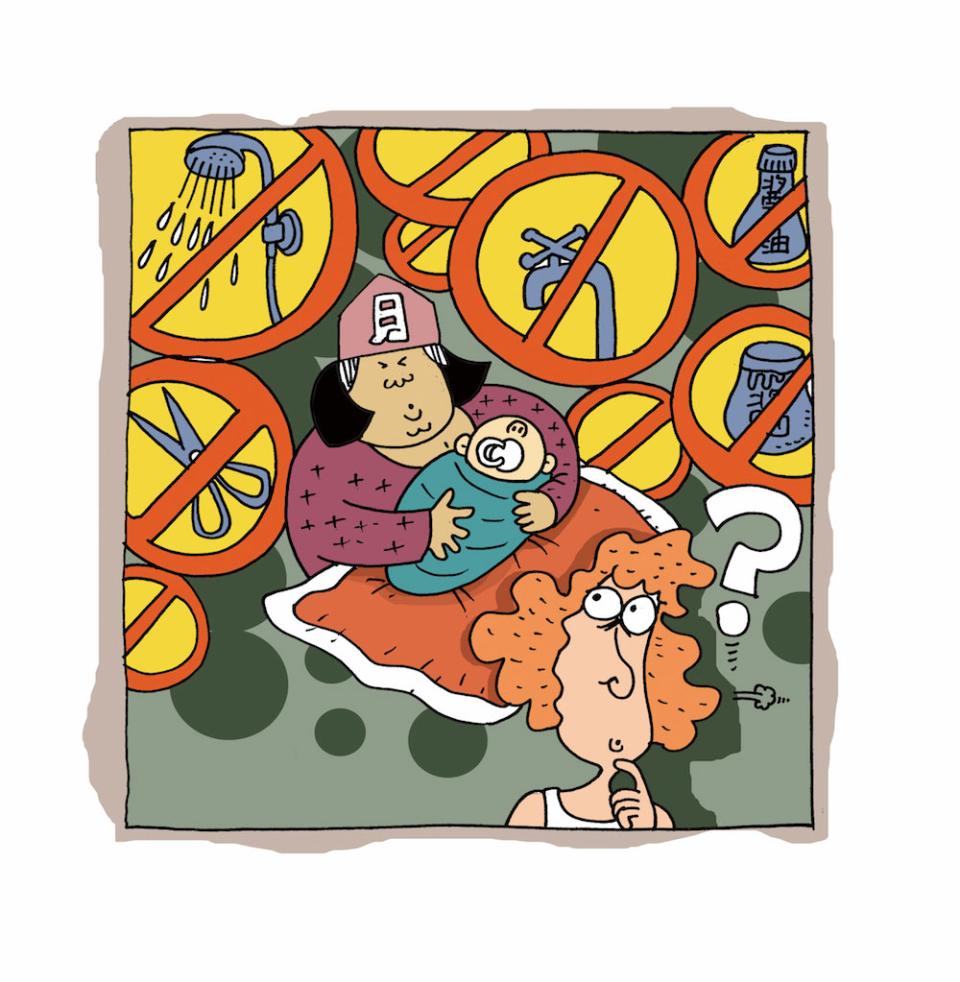Other rituals on reaching this important milestone include shaving the baby’s head and using the hair to make a calligraphy brush, a perfect memento to keep beside the stamp made with the baby’s umbilical cord

Illustration by Liu Xiaochao
Since my arrival in September, my time in Taipei has been filled with amusing encounters with local customs, and I have since become familiar with people warning me of the harmful effects that drinking cold water will have on my uterus (although it still baffles me how, despite the island’s stifling tropical heat, locals will continue to drink boiling water all through the summer months). However, this is nothing compared to the rules and traditions that surround pregnancy and childbirth in Chinese society.
As luck would have it, my adoptive Taiwanese family kindly arranged for the gestation and birth of their second son to coincide with my time on the island, and thus began a new chapter of my cultural education, starting with a list of foods to be avoided. Soy sauce, chocolate and any other “dark” foods were off the cards, as it is apparently widely known that these will give the baby a dark complexion. For those who aren’t familiar with the eternal Asian quest for pallor, it leaves many women desperately shielding their skin from the sun under long pants, long sleeves and gloves in 35-degree heat.
Second: no cold things (obviously). Pregnant women are also not supposed to lift their arms above shoulder level for fear of miscarriage, nor are they allowed to cut their hair as this may give the baby a facial deformity. For my Taiwanese friend, engagement ceremonies and weddings were also out of the question, for fear that her own good fortune in becoming pregnant would clash with the good fortune of the bride-to-be.
When the baby was finally born I imagined the mother would now be free from all these constraining rules, but I couldn’t have been more wrong. After childbirth, women are expected to undertake an intense month of rest, a tradition known as “sitting the month.” As well as staying in bed for 30 solid days, new mothers are not supposed to shower, certainly not wash their hair, and previous generations even cautioned them against brushing their teeth. This is based on the traditional belief that, after childbirth, the woman’s skin is loose and water can enter through the pores, causing headaches and colds. After pointing out that most of our mothers back home seem to have done okay without this month in bed with no showering, it was explained to me that “this is why your mothers look old so quickly, whereas our women stay looking young.”
I happen to think that my mother looks pretty damn fantastic for her age, but I brushed off the comment.
Many rich women elect to spend this month in luxurious postpartum confinement centers (away from the inevitable nagging mother-inlaw), where 24-hour care for the new mother and her baby is provided by expert nurses while chefs prepare traditionally nourishing Chinese dishes five times a day. Yoga classes are a given, while plastic surgery clinics are conveniently situated on the floor above the maternity ward for women who want to make the most of the month of enforced bed rest to tidy up their facial features or get moles removed. All this for a bargain US$200-300 a night.
However, for those who don’t feel like forking out half a year’s wages for a month in a fancy confinement clinic, there is the option of hiring a professional ayi to help take care of the new baby at home and prepare all the traditional “sitting the month” foods. Shortly after the birth, I joined my friends for dinner at their apartment, where the table was loaded with various colorful dishes: pigs’ liver for its restorative effects on the liver, kidneys to fortify the kidneys and broccoli because it’s just generally great. The meal’s central dish was chicken soup, which is consumed at every meal by new Chinese mothers, and which was just about the most booze-laden soup I had ever tasted. When inquiring as to how she could be drinking this every day when breastfeeding, I was told that if you boil the alcohol it isn’t harmful for the baby. Either way we were all swaying slightly by the end of the meal, and although my experience with babies is fairly limited, this one did seem particularly sedate.
I was alerted to the end of this month-long ordeal by the appearance of a large box of “oil rice” and chicken at my apartment one day, along with two dyed-red eggs which supposedly symbolize happiness and renewal of life. Such packages are given to friends and relatives by the parents of the new baby to celebrate it reaching one month of age. Other rituals on reaching this important milestone include shaving the baby’s head and using the hair to make a calligraphy brush, a perfect memento to keep beside the stamp made with the baby’s umbilical cord. For many mothers this is the first time they are allowed outside the house in a month, also meaning that they are finally free to wash their hair.
They still don’t drink cold water, though.

 Old Version
Old Version
